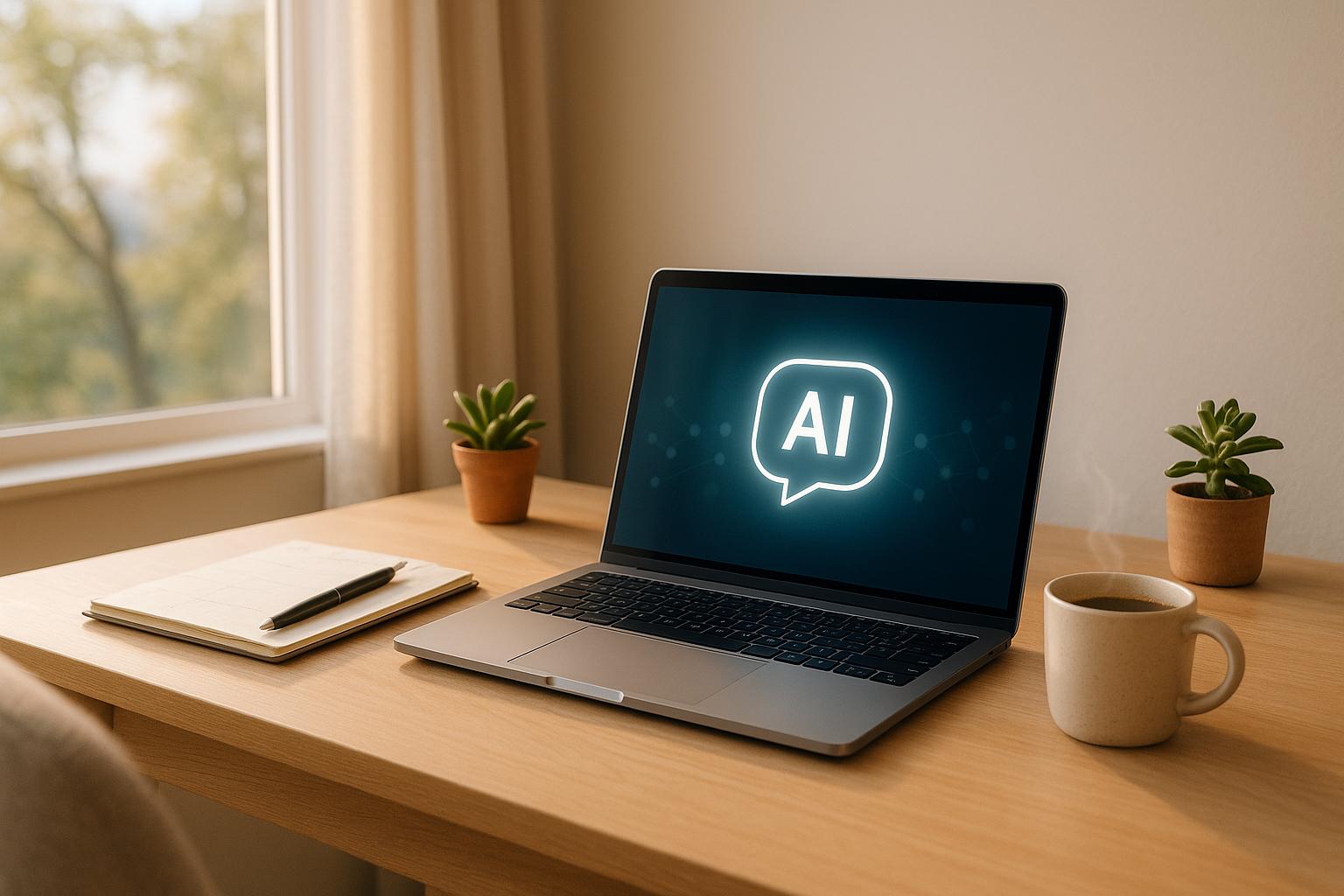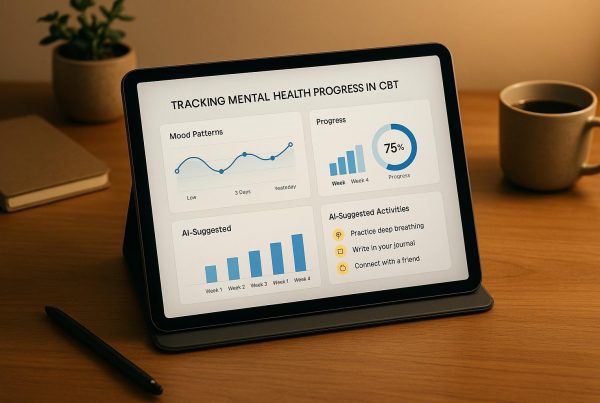Remote work is convenient but comes with challenges like overworking, burnout, and blurred boundaries between personal and professional life. AI tools are changing the game by helping remote workers manage schedules, set boundaries, and reduce stress effectively. Here’s how:
- Time Management: AI automates scheduling, blocks time for focus, and adjusts for time zones.
- Boundary Setting: Filters non-urgent messages, manages notifications, and sends auto-replies to protect personal time.
- Stress Detection: Monitors work patterns to spot burnout and offers real-time mental health support.
For instance, platforms like Aidx.ai provide personalized coaching, reminders, and privacy-focused mental health tools for $20/month. With features like voice-enabled support, goal tracking, and stress management, AI helps remote workers stay productive without sacrificing well-being.
AI isn’t just a tool – it’s a solution for creating balance in remote work.
The Future of Remote Work: AI Tools Redefining HR and Work-Life Balance
Common Work-Life Balance Problems for Remote Workers
Remote work offers flexibility and freedom, but it also brings unique challenges that can affect mental health and productivity. Recognizing these issues is crucial to addressing them effectively and finding ways to restore balance.
When Work and Personal Time Overlap
One of the biggest hurdles for remote workers is the lack of clear boundaries between work and personal life. When your bedroom doubles as an office or your kitchen table becomes a meeting space, it’s tough to unplug. In fact, 81% of remote workers admit to checking emails after hours, with 63% doing so on weekends and 34% even while on vacation [4].
This blurred line isn’t just about physical spaces – it’s also about expectations. Family members often assume that being home means being available for every household task. This leaves many remote workers struggling to explain that just because they’re physically present doesn’t mean they can mentally switch gears during work hours.
Overworking and Burnout
Remote work often leads to longer hours, which can spiral into burnout. On average, remote employees work three extra hours daily, and 38% feel pressured by management to extend their workday. Unsurprisingly, 76% report burnout, while 86% feel exhausted, with digital communication tools adding to the stress [6][8][9][10]. In fact, 69% of remote workers say these tools have increased their burnout levels [10].
The consequences go beyond just feeling tired. Remote and hybrid work setups are linked to higher rates of anxiety and depression – 40% for remote workers and 38% for hybrid workers, compared to 35% for those working in person [10]. Tina Halliday, LCSW, Behavioral Sciences Manager at Huntsman Mental Health Institute, explains:
"Burnout can cause you to lose a sense of balance in life and lose passion for your work. Burnout creates a vicious cycle of working harder to fix the situation, which contributes to exhaustion, withdrawal, depression, and anxiety, often leading people to rely on substances like alcohol or drugs to cope." [7]
Home Distractions and Time Zone Challenges
Remote workers also contend with distractions that office workers rarely face. Sixty-six percent report being interrupted, with 25% citing household chores as a major distraction [4]. Each interruption can take about 23 minutes to regain focus, draining mental energy [3].
On top of that, time zone differences can wreak havoc on schedules. A remote worker might start their day with a 6:00 AM call for one team and end it with a 9:00 PM meeting for another, while juggling personal interruptions throughout the day. This fragmented schedule often stretches far beyond normal working hours, leaving little time to recharge.
The strain is evident. Remote employees in the U.S. now work an average of three hours longer per day since the pandemic began [5]. Yet, despite these extended hours, many feel less productive due to constant distractions and scheduling conflicts. These ongoing challenges highlight the pressing need for smarter solutions to help remote workers reclaim their boundaries and find balance.
AI Tools That Support Work-Life Balance
Remote work comes with its own set of challenges, from blurred boundaries to the looming threat of burnout. Fortunately, AI tools are stepping up to help remote workers take control of their schedules, maintain healthy boundaries, and manage stress. These tools are designed to streamline tasks like scheduling, boundary-setting, and stress management, making it easier to navigate the complexities of working from home.
Automatic Scheduling and Reminders
AI-powered scheduling tools are reshaping how remote workers manage their time. These tools can automate calendar management, block off time for focused work, and even schedule breaks. They also send reminders to step away from the computer, ensuring work doesn’t spill into personal time.
What sets these tools apart is their ability to learn your work patterns and energy levels. They can identify your most productive hours and safeguard them from interruptions like meetings. Need to juggle time zones? No problem – AI takes care of that too, adjusting meeting times and sending reminders that account for different locations.
AI reminders also help establish a routine, something that remote work often lacks. From nudging you to take a lunch break to signaling the end of the workday, these tools help create a structure that supports both productivity and well-being. Beyond time management, AI also steps in to fine-tune communication, ensuring your personal time stays protected.
Smart Features for Setting Boundaries
One of the toughest parts of remote work is knowing when to unplug. That’s where AI boundary-setting tools come in. These tools help create a clear divide between work and personal life by filtering out non-urgent communications and managing notifications based on your availability.
AI can distinguish between messages that need immediate attention and those that can wait, ensuring your personal time isn’t constantly interrupted. Some systems even draft automatic replies to let colleagues and clients know when you’re unavailable, setting clear expectations about your work hours.
Break reminders are another standout feature. These aren’t just generic alerts – they’re smart enough to detect when you’ve been working too long or when your focus is waning. Based on these cues, the AI might suggest a quick walk, a breathing exercise, or simply stepping away from your desk for a bit.
Real-Time Help for Stress and Burnout
Work-related stress and burnout are alarmingly common, with 83% of U.S. workers reporting stress and 76% experiencing burnout[12][13]. AI tools are stepping in to provide real-time support, offering relief exactly when it’s needed most. These systems monitor factors like work hours, communication patterns, and productivity levels to spot early signs of stress or burnout.
For example, AI-powered mental health tools can pick up on subtle changes – like shifts in typing speed or tone – that may indicate stress. Once detected, they can offer tailored solutions, from stress-reduction techniques to curated resources or even referrals to mental health professionals[11].
What makes these tools so effective is their immediacy. Whether you’re in the middle of a tense meeting, dealing with a tough email, or feeling overwhelmed by your workload, AI can step in with suggestions like mindfulness exercises, meditation sessions, or tips for better sleep. For remote workers who might feel cut off from traditional workplace support, these tools offer a constant, judgment-free resource available 24/7.
AI’s role in supporting remote work represents a shift toward proactive care. It ensures that the flexibility of working from home doesn’t come at the expense of mental health or personal well-being, making it easier to strike a healthy balance between work and life.
sbb-itb-d5e73b4
Aidx.ai: Complete AI Support for Remote Workers

Aidx.ai takes AI-driven stress management to the next level by offering a comprehensive support system designed specifically for remote workers. Recognized as AI Startup of the Year by the UK Startup Awards (South West), this platform goes beyond standard productivity tools, addressing the unique mental health and performance challenges faced by those working from home.
Aidx.ai provides real-time guidance tailored to your emotional state and work environment. Whether you’re dealing with stress, struggling to set boundaries, or feeling burned out, this proactive support is especially helpful for remote workers who may miss the informal connections of a traditional office setting.
Personal Coaching with Adaptive Therapeutic Intelligence™
At the heart of Aidx.ai is its Adaptive Therapeutic Intelligence (ATI) System™, which acts like a personal coach and therapist available 24/7. This system uses evidence-based methods, including CBT (Cognitive Behavioral Therapy), DBT (Dialectical Behavior Therapy), ACT (Acceptance and Commitment Therapy), NLP (Neuro-Linguistic Programming), and performance coaching techniques, to guide users toward meaningful progress.
"Aidx isn’t just another AI tool – it’s powered by our Adaptive Therapeutic Intelligence™, a voice-enabled system trained in real therapy and coaching techniques. It delivers tailored, effective support for stress, confidence, and progress around the clock." – Aidx.ai
Research indicates that 75% of people are open to AI-driven mental health support, with men being three times more likely to prefer AI over traditional therapy [14]. For remote workers who may feel isolated or hesitant to seek help, this accessibility can be a game-changer.
Voice Features and Multi-Device Access
Aidx.ai’s voice-enabled interface and multi-device compatibility (available via web, app, or Telegram) make it easy to access support whenever and wherever you need it. Whether you’re taking a break, commuting, or relaxing after a long day, you can engage in natural, human-like conversations with Aidx. This hands-free functionality is especially useful for remote workers who spend long hours at their desks but still need flexible, on-the-go support.
Built-In Planning and Progress Tracking
The platform also helps users stay organized and track their growth. Aidx.ai integrates goal-setting, reminders, and notifications across multiple channels like email and Telegram, ensuring you never miss a key alert. This planning system is ideal for remote workers trying to maintain balance and structure in their day-to-day routines.
Additionally, Aidx.ai’s self-monitoring tools track changes in emotional states, confidence, stress, and performance. By providing measurable insights, it helps foster self-awareness and encourages consistent improvement.
Specialized Modes for Every Situation
Aidx.ai offers a variety of modes tailored to different needs:
- Microcoaching Mode: Quick, 5-minute sessions to gain clarity fast.
- Embodiment Mode: Helps you imagine and experience desired mental or emotional states.
- Incognito Mode: Private sessions that automatically delete after 30 minutes, ensuring confidentiality.
These modes are designed to help remote workers address specific challenges while maintaining a clear distinction between work and personal life.
Privacy and Data Security You Can Trust
Given the sensitive nature of mental health and performance coaching, Aidx.ai takes privacy seriously. It is GDPR compliant, encrypts all data, and ensures that no human oversight occurs unless legally required. This means your sessions remain private, offering peace of mind to those concerned about confidentiality or workplace stigma. By prioritizing security, Aidx.ai creates a safe space for users to focus on their well-being.
For €20 per month, the Elevate plan provides unlimited chat, voice features, access to all specialized modes, and a built-in planner. It even includes a 30-day money-back guarantee, making it a comprehensive and accessible option for remote workers seeking mental health and performance support.
Conclusion: AI Makes Remote Work-Life Balance Achievable
Remote work has brought its own set of challenges, but AI tools are stepping up as game-changers for professionals navigating this new landscape. By creating systems that address imbalance before it even begins, AI offers solutions that go beyond simple fixes. This aligns with earlier discussions about how AI supports scheduling and boundary-setting.
Consider this: 75% of people are open to AI-driven mental health support [14], yet 86% of remote workers report high levels of exhaustion [2]. AI doesn’t just react to these issues – it proactively works to prevent them.
"Real balance isn’t about forcing yourself to step away. It’s about designing a system that prevents work-life tilt from happening in the first place." – Carla Dewing, Author [1]
AI helps by automating repetitive tasks, fine-tuning schedules, and offering real-time support to ease stress before it builds up. This approach makes remote work sustainable while still keeping the human connection intact.
For those who can’t easily access therapy, AI offers a practical, affordable solution. AI-based therapy can cost up to 80% less than traditional sessions and removes barriers like appointment availability, which 50% of therapy seekers struggle with [14]. Platforms like Aidx.ai provide 24/7 access to evidence-based coaching, making mental health support as convenient as checking your email.
High achievers are already using AI to set boundaries and maintain peak performance [1]. By streamlining workflows, personalizing productivity strategies, and eliminating unnecessary tasks, AI creates room for both professional success and personal happiness.
The future of remote work isn’t about choosing between being productive and maintaining balance. It’s about leveraging AI to achieve both. Whether you’re facing isolation, struggling to unplug, or just looking to fine-tune your daily routine, AI tools offer the structure and support to make remote work not just manageable, but genuinely enjoyable.
As remote work continues to evolve, those who embrace AI-driven strategies for balance won’t just keep up – they’ll excel. With the tools and techniques outlined here, it’s clear that AI is reshaping the dynamics of remote work. The technology is ready – why not start today?
FAQs
How can AI tools help remote workers maintain a healthy work-life balance?
AI tools are stepping up to help remote workers maintain a healthier balance between their professional and personal lives. By automating repetitive tasks, managing schedules, and setting boundaries, these tools take some of the stress out of working from home. For example, AI-powered platforms can organize structured work hours, send reminders to take breaks, and activate ‘do not disturb’ settings to ensure you can truly unplug after your workday ends.
What’s more, these tools can analyze your work habits to recommend the best times for focused tasks and downtime, helping to lower the chances of burnout. With features like smart scheduling, managing notifications, and tracking habits, they make it easier to keep work and personal life separate, boosting both your well-being and productivity.
How does Aidx.ai help remote workers maintain mental health and productivity?
Aidx.ai offers round-the-clock AI-driven coaching and therapy, tailored to individual needs. It draws on proven methods like CBT (Cognitive Behavioral Therapy), DBT (Dialectical Behavior Therapy), ACT (Acceptance and Commitment Therapy), and NLP (Neuro-Linguistic Programming) to enhance the mental health and productivity of remote workers. With its voice-enabled interface, users can engage in natural, hands-free conversations, making it a convenient tool to access support even on the busiest days.
The platform also provides practical features like goal-setting, stress tracking, and self-monitoring. These tools help users stay organized, monitor their emotional health, and track their progress over time. By combining real-time support with actionable planning tools, Aidx.ai helps remote workers strike a healthier balance between work and life while fostering personal growth.
Can AI tools identify stress and burnout early, and how do they help address these issues?
AI tools have the ability to spot early signs of stress and burnout by analyzing behavior patterns, communication styles, and workload trends. For instance, they can pick up on subtle shifts like reduced engagement or inconsistent work habits, which might signal growing stress levels.
To assist users, these tools provide tailored support, such as tips for managing stress, reminders to prioritize self-care, and advice on balancing workloads. Acting as an early warning system, AI empowers individuals to address stress early, supporting mental well-being and helping to prevent burnout from worsening.



